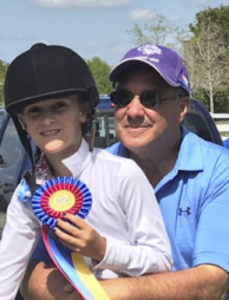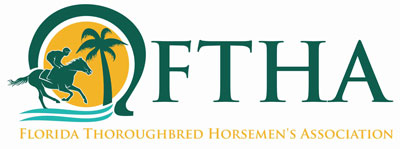 He grew up outside of Philadelphia and spent many years touring the Mid-Atlantic racing circuit, but trainer Joe Orseno now has his roots firmly planted in South Florida. Orseno, the second Vice President of the Florida HBPA, decided to make the Sunshine State his year-round home in 2016, and that choice has been a profitable one, both personally and professionally.
He grew up outside of Philadelphia and spent many years touring the Mid-Atlantic racing circuit, but trainer Joe Orseno now has his roots firmly planted in South Florida. Orseno, the second Vice President of the Florida HBPA, decided to make the Sunshine State his year-round home in 2016, and that choice has been a profitable one, both personally and professionally.
“When I was younger, I’d spend the winter in South Florida and go back and forth. I was always away, and I was working night and day,” he said. “But when my youngest daughter reached the age to start school, I really didn’t want to be away so much. I decided maybe it was time to stay in one spot. It was a good time for it.”
Days that in the past that might have been spent on the road are now enjoyed with his wife Michelle and 12-year-old daughter Aly. There is more time to visit with his son Joseph and daughter Shannin, now grown, and his three grandchildren. The move has also been a boon for his business, as Orseno went all in on the Florida-bred program.
“I wanted to rebuild my stable, and I thought the best way to do that would be to go to Ocala, talk to people I know, and start getting Florida-breds,” he said. “It’s been fantastic. I have a lot of nice horses, and I am very happy with the situation.”
The Orseno stable’s big horse is Imprimis, a 7-year-old gelding who has won nine of his 19 career starts, with a pair of graded-stakes victories and $865,983 in earnings. The talented turf sprinter even took his trainer and owner Breeze Easy, LLC, to Royal Ascot for the 2019 Group 1 King’s Stand Stakes, where he finished a respectable 6th in the 12-horse field.
Breeze Easy has an up-and-coming star in the 2-year-old colt Hope In Him, an impressive debut winner at Gulfstream on June 4, who heads next to the July 31 $100,000 FTBOA Florida Sire Stakes. “It looks like he will be one of the favorites,” Orseno said.
Also showing a lot of promise is the 3-year-old Double Diamond filly Running Memories, who took three of four starts at Gulfstream and added an allowance race at Monmouth earlier this month. She is pointing for the July 10 Blue Sparkler Stakes at the Jersey oval. “She’s done everything right so far,” her trainer enthused.
All three are Florida-breds, but each represents a different division. That’s a versatility Orseno has demonstrated in the past.
“I have been on interviews with big outfits, and they always ask, what kind of horse do you like to train?” the veteran horseman said. “But I don’t have one style of training; I train all my horses as individuals. I look at them all as individuals.”
Case in point? Orseno’s highlight reel from 2000, when he was training privately for the Stronach Stable, includes the exploits of champion juvenile Macho Uno, winner of the Breeders’ Cup Juvenile; Preakness hero Red Bullet; Breeders’ Cup Filly and Mare Turf champion Perfect Sting; and the 5-year-old gelding Golden Missile, who won the Stephen Foster and Pimlico Special back-to-back.
“I had a 2-year-old colt, a 3-year-old colt, an older turf mare and an older gelding – four different categories, all at the top of their game,” Orseno said. “The year 2000? That was a year second to none.”
The skills needed to be a top-class horseman were not ingrained from an early age. Orseno is the first in his family to get involved in racing. He credits a fortunate encounter with a little-known trainer for giving him the foundation for a successful career.
“I was introduced to racing by my father, he would go to the races at Garden State Park and take me,” Orseno reminisced. “When I was in high school, I got a job parking cars at a restaurant across the street from the track. I met a lot of jockeys and owners and trainers, and I met the right trainer – Mickey Crock.
“There are horsemen and horse trainers,” he continued. “Mickey was a true horseman. He taught me from the ground up, he taught me how to take care of the horse.”
An early lesson involved a horse that was bearing out badly in his races. For Crock, trying to force the horse to keep a straight course was not the answer.
“Back in those days, they had this run-out bit with these big prongs to keep the horse from bearing out,” Orseno said. “I asked Mickey, ‘why don’t we get one?’ He said, ‘Why don’t we fix the problem with the horse?’ Mickey taught me how to spot problems and how to fix them. I never like to give up on a horse. I want to give the horses every opportunity to show their true potential.
“If it’s fixable, I’ll try to find the solution.”
Orseno brings that mindset to the Florida HBPA Board, where he has served for five years. The decision to run for election is not one he took lightly.
“I was still traveling back and forth and I was asked to run for the Board,” Orseno said. “I hadn’t really thought about it before. I didn’t want to do it unless I could really give a good effort.”
When the votes were counted after his initial foray into the world of horse racing politics, Orseno found himself as an alternate on the Board.
“That was a good way to get my feet wet,” he said. “I had the chance to see more of how things work from the inside. That was an eye opener. I had never paid attention to that before.”
With one term as an alternate under his belt, the Philly native ran again, and was elected. He is now serving his second term. His focus is working to improve what he can for Florida’s horsemen – on the backstretch, with the track surface, or in the day-to-day business of horse racing.
“I feel that my presence is making a difference,” Orseno said. “Knowing Mike Lakow [Vice President Racing Operations at Gulfstream Park] and Billy Badgett [Executive Director of Florida Racing Operations], I can go to them with problems and I know they will listen because they know me. They know I’m not complaining just to complain; I am trying to make things better.”
He added, “We have a good group with this Board, led by Stephen Screnci – he’s the absolute best. He has opened my eyes to what we can accomplish.”
The achievements include dental and eyeglass programs for the backstretch workers, aftercare programs for the horses, and initiatives to lower the cost of doing business for the horsemen.
“We have been working diligently to get a workers’ compensation policy to cover our trainers, but we are having trouble getting 100% cooperation, which has slowed the process,” Orseno explained. “It would make such a difference if we could get a policy like they have at Monmouth. The worker’s compensation premium is a big nut at the end of every month. If we can get the trainers to work with us and put that program in place, that would be real progress. That could be part of this Board’s legacy.”
He added, “People don’t understand all that goes on behind the scenes, but we have good people putting in the hours. Not as many as Stephen, but we are working hard, and I like to think we are getting things done.”



